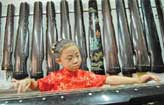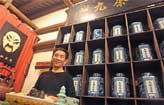Economy
Sowing the seeds of doubt
Updated: 2011-08-03 11:10
By Zhou Siyu (China Daily)
"We would like to work with the new policy to accelerate the development of the industry, particularly in the conversion of farmers from low-quality seeds to high-quality," Ramsay said.
Syngenta is the leader in China's vegetable-seed market, especially in varieties such as tomatoes and sweet peppers. In 2010, its sales in China saw "a high single-digit increase for vegetable seeds", according to the company.
"There has been very strong growth in China for a number of years. And we see no disruption to that trend in the near future," Ramsay said.
"But our market share is very small (because the market is highly segmented), and sales in China contribute only a very limited amount to our global sales," he added.
Kevin Eblen, regional leader of Monsanto North Asia (a division of Monsanto Co) said his company has the same problem in terms of market share and sales. The company is the world's largest producer of genetically modified (GM) seeds and globally holds "a major market-share advantage" in GM soybeans, corn, cotton and canola, the company said. However Chinese regulations prevent foreign companies from producing and developing GM seeds.
This policy has had a significant impact on Monsanto's business in China, Eblen said.
Even with the regulations, there are still plenty of reasons for the Chinese government to be cautious, said Jing Fei, a seed expert at Bohai University.
If the government were to give the green light to allow foreign companies to produce GM seeds, the global giants such as Monsanto and Pioneer would dominate the Chinese market with their world-class technologies and seed resources, according to Jing.
"Chinese companies are at an elementary stage in GM technology research," he said. "They will be vulnerable in the face of giants such as Monsanto and Pioneer."
Monsanto has set up three joint ventures and also owns three companies in China (bought before the shareholder regulations were applied) and its seed business focuses on hybrid corn, GM cotton and conventional vegetable seeds. Its hybrid corn seeds, sold under the name of Dekalb, are mainly grown in provinces in the southwest of the country.
In 2010, Monsanto's global sales declined 10.4 percent year-on-year to $10.5 billion, according to the company's figures. The Chinese market contributed less than 1 percent to the global total, according to Eblen.
"We currently have a very limited market share in China," he said, "but our business is growing steadily and we obviously see great prospects for the future here."
On the shoulders of giants
Despite the heated debate about the influx of foreign companies and the country's food security, farmers in Shanxi province have experienced the benefits brought by advanced technologies and services. Wei, the local seed officer, said yields of Pioneer 335 are 10 to 15 percent higher than common domestically produced corn seeds.
This means additional income of 7,500 yuan ($1,162) for every hectare annually, Wei said.
Better yields can now be gained with less labor. Traditionally, farmers put half a dozen seeds in each drill hole to ensure at least one of them would sprout. But Pioneer's technology enables farmers to sow a single seed in each hole, with a germination rate of more than 95 percent, according to the company.
Single-seed planting technology can save farmers the time and effort required to remove competing seedlings from the same hole, a labor-intensive task which is usually performed under the scorching summer sun.
"These technologies improve efficiency and make the work of planting easier," Wei said. "To the farmers, they are revolutionary."
More appealing to the farmers are the services the company has brought to their fields: the single-planting technology has facilitated the use of mechanized seed drills. Every spring, Pioneer instructs local distributors to organize a team of farmers to help sow seeds mechanically. The team charges 300 yuan to sow a hectare with corn. In good years, each hectare can yield crops worth 30,000 yuan.
"The work is exhausting, but I can earn 10,000 yuan for just one week of ploughing every spring," said Hao Quanxiang, a member of the crop-sowing team.
Hao and his machine will work for any farmer in Shitie county that requires their services. During the spring ploughing period, his working day begins at 3 am and ends late at night.
The mechanized drills are owned and shared by Pioneer's seed distributors. The company provides a subsidy of 1,000 yuan for each machine, said Zhang, the Shitie county distributor. Shitie currently shares 100 machines with neighboring counties, and the number is growing every year.
"The machines make our lives much easier," said Meng Chunying, a 51-year-old farmer. Meng has two children, but they have both left home to earn more money working in the city. China's fast pace of urbanization has seen young people move away from villages, leaving behind just the elderly and children.
"With the machines and Pioneer's seeds, my children do not need to come back for spring ploughing every year," Meng added. Spring ploughing is one of the busiest periods in the annual timetable of the rural areas.
Pioneer's seeds have become so popular with China's farmers that some domestic companies have also launched single-seed planting products. Moreover, some disreputable operators have simply copied Pioneer's packaging and sold the seeds at half price.
Vendors of fake and counterfeit seeds often sell them directly to the farmers, claiming that they are the genuine article, a villager said.
Sometimes those who have been duped and suffer poor yields blame the genuine seeds and those who provide them, said Zhang, the seed dealer.
Last year, a frustrated farmer spent an entire day standing at the door of Zhang's shop, swearing and insulting the couple inside. He had bought fake seeds and had a bad harvest as a result, Zhang said.
"I will always remember the feeling of frustration and humiliation of that moment. I intended to help people by selling better seeds. I do not deserve this," he commented ruefully.
For Zhao, the distributor in Dongzhao county, the experience has been much more positive.
He and his wife sold their restaurant in a nearby city two years ago and moved back to their village to start a seed business.
"I was a chef and knew almost nothing about farming," Zhao said, recalling his first year in the business.
"This is a quiet business. It takes time to gain the villagers' trust," he said. "So far, everything has been going well and the future will be better," he said.
Sun Ruisheng contributed to this story.

Specials

Carrier set for maiden voyage
China is refitting an obsolete aircraft carrier bought from Ukraine for research and training purposes.
 Photo
Photo  Video
Video

Pulling heart strings
The 5,000-year-old guqin holds a special place for both european and Chinese music lovers

Fit to a tea
Sixth-generation member of tea family brews up new ideas to modernize a time-honored business